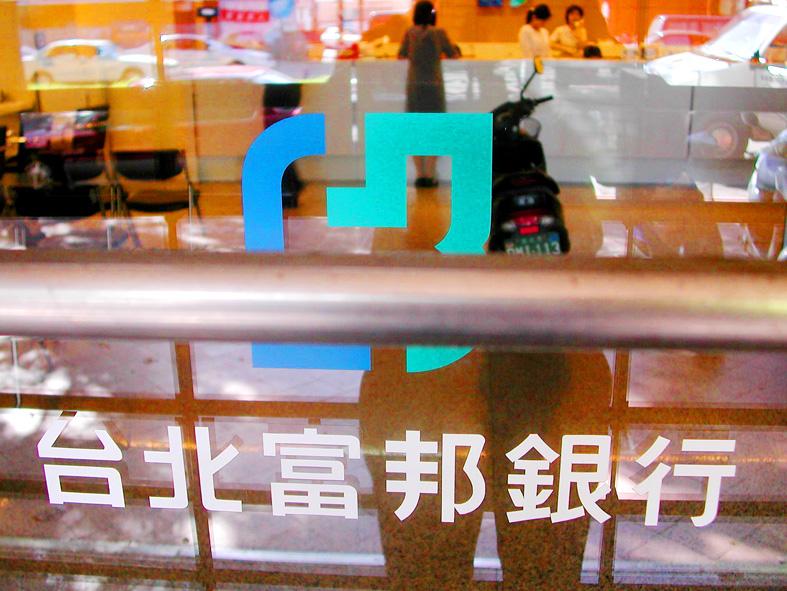Taipei Fubon Commercial Bank (台北富邦銀行) yesterday approved a three-year sustainability-linked loan (SLL) to audio electronics maker Merry Electronics Co (美律實業), the first such loan granted by a local bank.
However, the bank did not reveal the amount of the loan.
Foreign banks were the first to offer SLLs in Taiwan. DBS Bank Taiwan (星展銀行) provided NT$2 billion (US$70.66 million at the current exchange rate) of SLLs to AU Optronics Corp (友達光電) in 2019, followed by HSBC Bank (Taiwan) Ltd’s (匯豐台灣商銀) two SLLs totaling NT$450 million to Taya Group (大亞集團) and Sinbon Electronics Co (信邦電子) last year.

Photo: CNA
Like HSBC Taiwan and DBS Taiwan, Taipei Fubon would lower the loan’s interest rate if the borrower’s sustainability performance improves, which includes greenhouse gas emissions, power management and energy efficiency, the bank told the Taipei Times.
HSBC Taiwan also encouraged its borrowers to use the loans for their operations related to green energy or greenhouse emissions reduction, but Taipei Fubon said it has no such requirements.
“While green loans are only used to finance green projects, capital from SLLs can be used for general corporate purposes, according to the sustainability linked loan principal set by the Asia Pacific Loan Market Association,” the bank said.
“This would provide more flexibility for borrowers, but we would incentivize them to improve sustainability performance by rate cuts,” it said.
The Financial Supervisory Commission is looking into the international standards on SLLs and would consider issuing guidelines for banks on the conditions to approve such loans, a commission official familiar with the matter said by telephone yesterday.
The guidelines might have a definition of SLL, as well as regulations about banks’ and debtors’ information disclosure about how the special loans boost companies’ sustainability performance, the official said.
“The Taipei Exchange has named 16 specific purposes for which the proceeds from a sustainable bond can be used, such as green energy, water conservation, affordable housing and food safety, and the proceeds from an SLL might apply to the same purposes,” the official said.
Companies should set a sustainability target before taking out a loan, and explain how they would appoint an independent third-party agency to evaluate if the debtors meet their targets, the official added.
Banks can set their own rules until the commission issues guidelines, but they should confirm that the loans are utilized properly, the official said.

Taiwan’s rapidly aging population is fueling a sharp increase in homes occupied solely by elderly people, a trend that is reshaping the nation’s housing market and social fabric, real-estate brokers said yesterday. About 850,000 residences were occupied by elderly people in the first quarter, including 655,000 that housed only one resident, the Ministry of the Interior said. The figures have nearly doubled from a decade earlier, Great Home Realty Co (大家房屋) said, as people aged 65 and older now make up 20.8 percent of the population. “The so-called silver tsunami represents more than just a demographic shift — it could fundamentally redefine the

The US government on Wednesday sanctioned more than two dozen companies in China, Turkey and the United Arab Emirates, including offshoots of a US chip firm, accusing the businesses of providing illicit support to Iran’s military or proxies. The US Department of Commerce included two subsidiaries of US-based chip distributor Arrow Electronics Inc (艾睿電子) on its so-called entity list published on the federal register for facilitating purchases by Iran’s proxies of US tech. Arrow spokesman John Hourigan said that the subsidiaries have been operating in full compliance with US export control regulations and his company is discussing with the US Bureau of

Businesses across the global semiconductor supply chain are bracing themselves for disruptions from an escalating trade war, after China imposed curbs on rare earth mineral exports and the US responded with additional tariffs and restrictions on software sales to the Asian nation. China’s restrictions, the most targeted move yet to limit supplies of rare earth materials, represent the first major attempt by Beijing to exercise long-arm jurisdiction over foreign companies to target the semiconductor industry, threatening to stall the chips powering the artificial intelligence (AI) boom. They prompted US President Donald Trump on Friday to announce that he would impose an additional

China Airlines Ltd (CAL, 中華航空) said it expects peak season effects in the fourth quarter to continue to boost demand for passenger flights and cargo services, after reporting its second-highest-ever September sales on Monday. The carrier said it posted NT$15.88 billion (US$517 million) in consolidated sales last month, trailing only September last year’s NT$16.01 billion. Last month, CAL generated NT$8.77 billion from its passenger flights and NT$5.37 billion from cargo services, it said. In the first nine months of this year, the carrier posted NT$154.93 billion in cumulative sales, up 2.62 percent from a year earlier, marking the second-highest level for the January-September